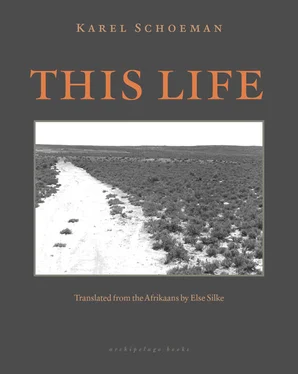Karel Schoeman - This Life
Здесь есть возможность читать онлайн «Karel Schoeman - This Life» весь текст электронной книги совершенно бесплатно (целиком полную версию без сокращений). В некоторых случаях можно слушать аудио, скачать через торрент в формате fb2 и присутствует краткое содержание. Год выпуска: 2015, ISBN: 2015, Издательство: Archipelago, Жанр: Современная проза, на английском языке. Описание произведения, (предисловие) а так же отзывы посетителей доступны на портале библиотеки ЛибКат.
- Название:This Life
- Автор:
- Издательство:Archipelago
- Жанр:
- Год:2015
- ISBN:978-0-914671-16-9
- Рейтинг книги:5 / 5. Голосов: 1
-
Избранное:Добавить в избранное
- Отзывы:
-
Ваша оценка:
- 100
- 1
- 2
- 3
- 4
- 5
This Life: краткое содержание, описание и аннотация
Предлагаем к чтению аннотацию, описание, краткое содержание или предисловие (зависит от того, что написал сам автор книги «This Life»). Если вы не нашли необходимую информацию о книге — напишите в комментариях, мы постараемся отыскать её.
considers both the past and future of the Afrikaner people through four generations of one family. In an elegiac narrator's tone, there is also a sense of compulsion in the narrator's attempts to understand the past and achieve reconciliation in the present. This Life is a powerful story partly of suffering and partly of reflection.
This Life — читать онлайн бесплатно полную книгу (весь текст) целиком
Ниже представлен текст книги, разбитый по страницам. Система сохранения места последней прочитанной страницы, позволяет с удобством читать онлайн бесплатно книгу «This Life», без необходимости каждый раз заново искать на чём Вы остановились. Поставьте закладку, и сможете в любой момент перейти на страницу, на которой закончили чтение.
Интервал:
Закладка:
We returned home and washed our feet and hastily I prepared the evening meal and laid the table, but when Father and Mother returned it was late, and no one asked what had happened during the day. When Maans spoke eagerly of the long walk we had taken, Father asked where we had gone, but he was tired and keen to go to bed and he scarcely listened to my answer. We walked to a place where we had taken out honey years ago, I said, for I wanted to see whether there were still bees, but there was nothing. We passed old shelters, I said, but we did not see any people; and then I got up to take Maans to his room, for he also had to go to bed. That was the first time I had ever lied to Father, but it was probably also something I had to learn, like the silence and the vigilance and the patience, and part of the skills I would need to survive. But in a way my story was not completely untrue, for while I was putting the child to bed I suddenly remembered that day when I was still very young and we all went along to take out the honey, Jakob and Pieter and Gert and I, and Gert removed the honeycomb from a cleft in the rock, and on our way back that evening one of them — I do not remember who — carried me on his shoulders for I was too exhausted to walk.
4

I do not believe Father ever had enemies, but it was during this time that we discovered just how fond people were of him and how highly regarded he had become in our district over the years, in spite of the secluded life we led on the farm; for as it became more and more difficult for him to move around among the people, it was they who started coming to him.
For as long as I can remember establishing our own congregation in the Roggeveld had been under discussion; that is to say, the men discussed it when we met for church services, for what concern was it of the women? During this time it was brought up again and began to receive more urgent attention, and it was specifically to learn Father’s opinion and obtain his advice that people came to call on us. We were not used to visitors, not to mention the substantial groups arriving now: we had to take all the coffee bowls from the kist and the spittoons that had never been used were brought out as well, and later Coenraad hired a stable boy whose chief duty it was to look after the visitors’ horses. Even Mother was surprised, though she would never have let it show, but there was a kind of agitation and nervousness in her behaviour as she welcomed the visitors, unlocked coffee and sugar and arranged for meals, and it was never clear to me exactly how welcome these uninvited guests were. In time, however, I believe she realised how the solemn gatherings of elders and deacons in our voorhuis flattered us and how those conferences dignified us, and somewhat unwillingly she began to go out of her way to welcome and entertain these visitors.
I had nothing to do with these meetings, of course, but as her daughter I remained in the kitchen to carry out Mother’s instructions, for by this time old Dulsie was no longer capable of much. One day, however, I was summoned unexpectedly when the men were struggling with a letter that had to be written. It must have been Father’s proposal, for I do not think any of those solemn old gentlemen would have considered such a possibility, but in the circumstances they could not offer much opposition. Thus I wrote the letter as it was dictated to me, head bowed over the paper, while from across the table they watched my skilfulness with silent disapproval. Afterwards I withdrew to the kitchen without any of those present expressing a single word of approval or appreciation, or even just thanking me. The letter must have been written well, however, or they were convinced of my skill anyhow, for after this I was often summoned to the voorhuis where the men sat with their pipes and their chewing tobacco, to put their letters and memorials and petitions in writing. When they discovered that I could not only write in an elegant, legible hand, but also had knowledge of words, they would allow me, somewhat stiffly and unwillingly, to express a thought they had been struggling with; sometimes they simply spoke, without taking notice of me, and allowed me to put down their thoughts in my own words. When I read aloud what I had written, they nodded slowly over their pipes, and that was the only thanks I ever got from any of them. “I must say, a daughter like this is worth as much to a man as a good team of trek oxen!” Oom Daantjie van Wyk once exclaimed, but he always liked to tease and everyone assumed he was only joking. Later they also discovered that I could read fluently, could decipher longhand writing and explain difficult words, and I was summoned to read the letters and documents that had arrived from Worcester and from the Cape.
I had never liked people, especially not the company of strangers, but to be called into the voorhuis like that by Father never bothered me, for it was the first time I realised there was something in the world I could do apart from helping Mother in the house and teaching Maans. Moreover, I began to realise that when I was called upon to read to the assembled people, I was not self-conscious and my slow tongue no longer encountered any obstacle. Later still, they found out I also knew some English, and then it was not only the deliberations about the new congregation I had to help with, but sometimes a neighbour rode over on his own with a letter from the magistrate or a newspaper from the Cape to ask Father whether his daughter might look at it for him. Father was proud of me then, that was clear, and it was actually the only chance he ever had to feel proud of me, for I was a shy, withdrawn child who did not normally attract any attention or elicit any approval.
I bent my head over the paper and wrote down the requests, objections or admonitions without considering what I was writing: the scratching sound of the quill pen, the men around the table in a haze of tobacco smoke, and their monotonous arguing voices interspersed with sudden outbursts of anger or indignation, “in order that they, the undersigned members of this congregation, want to make their wishes known to the designated authorities, in accordance with their humble request …” It was not only here in the Roggeveld that the establishment of a congregation was being considered, for during this time many changes were taking place in these parts, as I discovered from the men’s conversations where I sat in the voorhuis, waiting to be told what to write. In the Bokkeveld, as well as the Hantam and the Nuweveld, towns were being founded, there was mention of churches being built, ministers being called and church councillors elected. Around us new congregations came into being and the boundaries of the old ones shifted; magistrates and schools and such matters came under discussion, hitherto no more than strange, distant phenomena to us, connected with Worcester and the Boland, on the outskirts of the world we knew. When I got up and withdrew from the voorhuis, I soon forgot all about these matters, however, just as I forgot about the letters or petitions I had drawn up, for these were the men’s affairs and did not concern me.
I still taught Maans, but he was beginning to grow up and did not spend all his time with me like before. He often rode out to the sheep; at first Coenraad took him on his horse, but then he learned to ride and Father gave him his own horse, ordered from the Hantam. He was given more and more duties on the farm and, after he had been my responsibility for so many years, I lost him again, the baby I had held on my lap when I arose from my long sickbed. The beams had collapsed, the thatch had mouldered, and nothing remained. Sometimes the house seemed very big and quiet and empty as we lived together in silence, Mother and Dulsie in the kitchen and Father in his armchair in the voorhuis: when I had nothing to do, I would sit close to him with some item of sewing, but it would soon slip from my clumsy fingers and I would just sit there, not moving or having the least desire to speak, silently occupied with thoughts I was unable to express. The thatch had mouldered, the stones had been scattered, and in later years there was no sign that a house had stood there, that people had lived there, the imprint of their feet no longer visible in the moist earth of the fountain where they had fetched water. I had fallen to my knees, tears pouring over my cheeks, but that was long ago. In the voorhuis I wrote letters for others and read their letters, but I never had any reason to write a letter myself, and not once did I receive one. I was a young woman and no longer a child.
Читать дальшеИнтервал:
Закладка:
Похожие книги на «This Life»
Представляем Вашему вниманию похожие книги на «This Life» списком для выбора. Мы отобрали схожую по названию и смыслу литературу в надежде предоставить читателям больше вариантов отыскать новые, интересные, ещё непрочитанные произведения.
Обсуждение, отзывы о книге «This Life» и просто собственные мнения читателей. Оставьте ваши комментарии, напишите, что Вы думаете о произведении, его смысле или главных героях. Укажите что конкретно понравилось, а что нет, и почему Вы так считаете.












